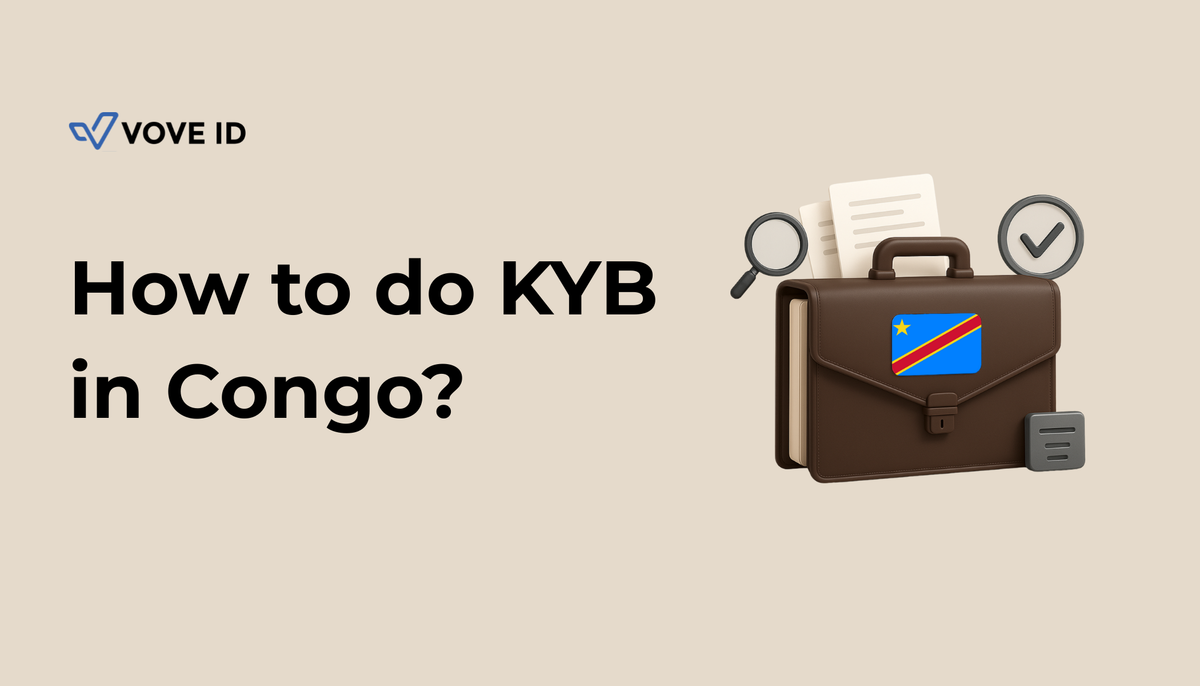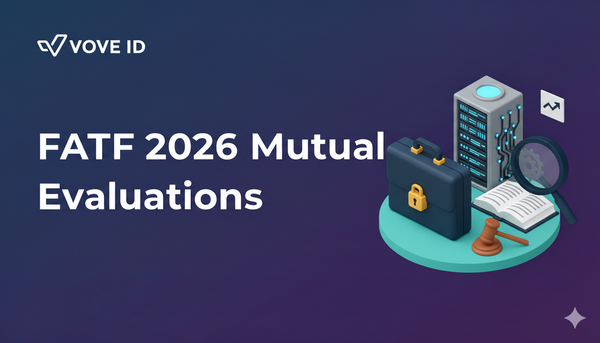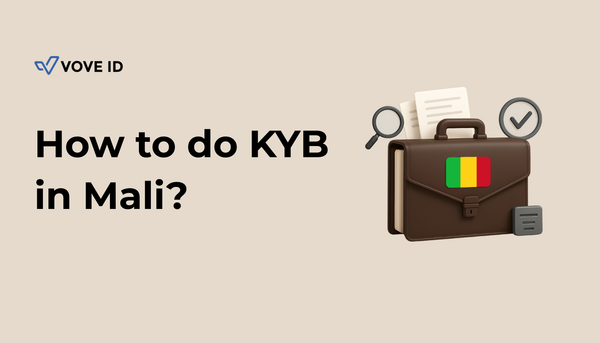KYB Compliance in the Democratic Republic of Congo (DRC): A 2025 Business Guide
Learn how to meet KYB compliance in the DRC in 2025. Explore local regulations, onboarding steps, risks, and how VOVE ID simplifies business verification in complex markets.

Doing business in the Democratic Republic of Congo (DRC) today means navigating a landscape that's rapidly evolving, especially in sectors like fintech, digital wallets, crypto, iGaming, and mobility. With increasing international attention and a more demanding AML/CFT environment, having strong Know Your Business (KYB) processes isn’t just good practice, it’s a necessity.
As eKYB adoption grows across Africa, digital identity verification in the DRC is becoming foundational for fintech platforms and other regulated businesses. In this guide, we unpack the regulatory context, compliance steps, unique risks in the DRC, and how VOVE ID empowers companies to onboard trusted business clients faster and with full compliance.
KYB Regulation in the DRC: Institutions & Legal Framework
Legal Foundations
The core AML/CFT legislation in the DRC is Law No. 04/016 of July 19, 2004, amended in 2016. This framework mandates customer due diligence (CDD), including KYB and ultimate beneficial ownership (UBO) checks for legal entities. Enforcement has historically been uneven, but recent reforms indicate growing institutional focus on compliance.
Who’s In Charge?
- CENAREF: The national Financial Intelligence Unit (FIU), responsible for receiving and analyzing Suspicious Transaction Reports (STRs).
- Central Bank of Congo (BCC): Supervises financial institutions and enforces AML obligations in banking, payments, and crypto.
- Other regulators, such as ARCA and ARCM, oversee insurance, securities, and other financial verticals.
The Regional & Global Context
The DRC is a member of GABAC, Central Africa’s FATF-style regional body. As of mid-2025, the country remains on the FATF “grey list”, under increased monitoring. While progress has been made, several technical and institutional gaps remain, especially around enforcement and beneficial ownership transparency.
KYB Requirements & Practical Steps
Registering & Verifying Companies
To verify a business in the DRC, companies typically provide:
- RCCM registration from the Commercial Registry
- Articles of incorporation
- Proof of registered address
- Director and shareholder lists
- Tax ID (NIF) and UBO disclosures
Though not always enforced consistently, UBO disclosures are increasingly expected, especially in mining, telecom, and financial sectors.
The process often runs through the GUCE one-stop platform, though processing times can vary significantly by region.
From Onboarding to Monitoring
- KYB includes identifying and verifying the business entity and its UBOs, ensuring legitimacy and AML compliance.
- Businesses are required to retain KYB records for a minimum of 10 years, as per local AML regulations.
- Ongoing transaction monitoring and STR reporting to CENAREF are required, though reporting levels remain low—partly due to system limitations and low digitalization.
The Local Risk Environment
KYB in the DRC isn’t just a box-checking exercise, and it’s essential risk management. Businesses operate in a complex environment shaped by:
- Illicit trade and conflict mining, especially in the east
- Cash-based economy with dual currencies (CDF and USD), making transactions harder to trace
- Informal business culture, with many SMEs lacking formal registration
- Limited registry digitization, complicating manual verification
- Cross-border risks and corruption, adding complexity to ownership verification
These challenges heighten exposure for fintechs, crypto platforms, and any company onboarding local businesses. Without KYB, the risk of onboarding shell companies, sanctioned entities, or fraudsters increases significantly.
4. Why KYB Matters for Regulated Businesses
Whether you're a fintech, payment platform, crypto exchange, or mobility tech startup, KYB is essential to:
- Avoid onboarding bad actors, shell companies, or sanctioned parties
- Meet regulatory expectations from local authorities and global partners
- Build credibility with international investors, payment providers, and banking partners
- Streamline onboarding in a market where traditional verification can take weeks
For startups seeking global investment or cross-border payment rails, robust KYB is not only about compliance—it's about credibility.
How VOVE ID Enables Smarter KYB in the DRC
VOVE ID provides an identity verification platform built for high-risk, low-infrastructure markets like the DRC. Our KYB solution enables:
- Real-time verification of business documents (RCCM, tax ID, NIF)
- Automatic UBO discovery and cross-checking with global sanctions and PEP watchlists
- French-language OCR and recognition of local document types
- Seamless onboarding workflows, via scalable API integration
- Regulatory audit trails aligned with FATF, CENAREF, and BCC expectations
VOVE ID helps regulated businesses in Africa onboard trusted partners quickly, without sacrificing compliance or accuracy.
Over 80 million mobile subscribers in the DRC are now part of the national DRCPass e-ID system, launched in June 2025. This will soon become a key pillar of digital identity verification and eKYB workflows, particularly for platforms serving SMEs and informal businesses.
Getting Ready for the Future
With DRCPass rolling out nationwide, businesses that integrate digital ID validation early will gain an edge in KYB efficiency and compliance readiness.
FAQs
❓ How fast can fintechs onboard a business client in Kinshasa?
With automated KYB platforms like VOVE ID, onboarding can be completed in minutes, compared to traditional processes that may take weeks.
❓ What KYB documents are required in the DRC?
- RCCM business registration
- Tax ID (NIF)
- Articles of incorporation
- UBO declarations (especially in mining, finance, or telecom)
❓ What sanctions lists should KYB screening include?
Firms should screen against UN, EU, OFAC (US), UK, and GABAC-aligned watchlists. This is particularly important in high-risk sectors and cross-border transactions.
Conclusion
As the DRC strengthens its AML/CFT framework, KYB compliance is becoming critical for businesses operating in the region. The risks are real—but so are the opportunities for those who get it right.
Ready to automate KYB in the DRC?
Talk to us about seamless onboarding with VOVE ID.
With VOVE ID, you can automate KYB in the DRC with confidence. Our platform helps you meet regulatory requirements, reduce onboarding time, and scale securely in one of Africa’s most dynamic and challenging markets.
The future belongs to those who act today. Smart KYB lets your business lead the way.




